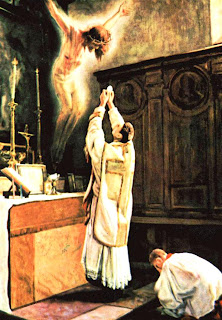One of the core issues
in opposition to the Pauline Liturgical reform has been that “No longer Latin,
but the spoken language will be the principal language of the Mass”[i]. In this piece, I will attempt to elucidate and critique some of the reasons behind Paul VI's decision to move towards vernacular masses
He acknowledges the “the beauty, the
power and the expressive sacrality of Latin”[ii]
and that it is “the speech of the Christian centuries”[iii]
which brought “the prayer of our forefathers and our saints to our lips and
gave us the comfort of feeling faithful to our spiritual past”[iv].Paul VI poses this; “We
are giving up something of priceless worth. But Why?”[v], “The
answer [he himself states] will seem banal, prosaic”[vi].
To avoid repetition I will analyse Paul VI’s reasoning concurrently as I
present it.
 He states his core principle
of Liturgical reform “Understanding of prayer is worth more than the silken
garments in which it is royally dressed”[vii].
I would agree, words without meaning are empty. However does this mean that the
silken garments need to be discarded, to be trampled underfoot?
He states his core principle
of Liturgical reform “Understanding of prayer is worth more than the silken
garments in which it is royally dressed”[vii].
I would agree, words without meaning are empty. However does this mean that the
silken garments need to be discarded, to be trampled underfoot?
It is not wrong “that
Catholics feel the need of a greater understanding of the sacred texts, from
which they draw spiritual nourishment, and that they want to be more intimately
involved in the action taking place in front of them”[viii].
It is their right and indeed obligation to understand the Catholic faith they
profess. If the laity cannot understand what the prayers mean they will be
robbed of great opportunities to unite themselves with the prayers of the Mass.
This is the understanding of Prayer.
However, one must ask;
is Latin even an obstacle? Paul VI states that as a result of the “greater
simplicity of the ceremonies”[ix] “[t]he
spiritual aspect [of the Mass] will be found to have greater richness”[x]. “If
the divine Language kept [the Church] apart from”[xi]
the people then it would be right and just to remove it. But did it? Archbishop
Lefebvre, with a lifetime’s pastoral experience, stated “Union with God can be
achieved as much by beautiful, heavenly music as by the general ambiance of the
liturgical action: the sanctity and religious feel of the place, or it
architectural beauty, or the fervour of the Christian community, or the dignity
and devotion of the celebrant, or symbolic decorations, or the fragrance of the
incense”[xii].
Simplifying the ceremonies has the opposite effect to enticing the laity to
deeper spiritual communion. The laity “come away tired from a Mass which
strives to bring itself down to the level of mankind instead of raising them to
God”[xiii].
Is not the Pauline Mass
robbing the Laity of their chance to Unite with God in the splendour of the
Liturgy?Does not burdening the laity with the liturgy’s
linguistic and semantic intricacies actually provide a barrier to true prayer,
uniting one’s self with God? “If too much attention is given to the meaning of
the words, they can even be an obstacle”[xiv].
The picture to the left is not merely for decoration. It quite proficiently answers the
question I have just discussed. If I could choose a caption for this picture it
would be ‘Susum Cordia’. The Mass is about raising your heart, not your mind,
to God.
Paul VI states that his
desired outcome for the new rite of Mass is that there will be “participation
by every single one present, and an outpouring of spirit in communal charity”[xv]
and with that “[t]he soul’s relationship with Christ and with the bretheren
thus attains a new and vital intensity”[xvi].
With the Latin Tridentine Mass, every member of the faithful was free to
participate as they required. If they wanted to actively assist with the
prayers of the Priest they were able to by following the rite of Mass in their
Missals, if they wanted to make private devotions which united them closely
with God then they could. Now the faithful have had their sacred space intruded
on by the so-called ‘active participation’. There is no longer any room for
personality in the Mass. Perhaps it is a curious new form of authoritarian neo-Montanism;
Rome wants every member of the faithful to think and feel exactly the same
thing. With this Pauline Mass, however, what most people feel is nothing.
[i]
Pope Paul VI, Changes in Mass for greater Apostolate, Address to General
Audience, 26-11-1969, Paragraph 8
[ii] IBID
[iii]
IBID
[iv]
IBID, Paragraph 2
[v]
IBID, Paragraph 9
[vi]
IBID, Paragraph 10
[vii]
IBID, Paragraph 11
[viii]
Archbishop M. Lefebvre, Open Letter to confused Catholics, Chapter ‘You’re a
Dinosaur’
[ix]
Pope Paul VI, Changes in Mass for greater Apostolate, Address to General
Audience, 26-11-1969, Paragraph 15
[x]
IBID
[xi]
IBID, Paragraph 12
[xii]
Archbishop M. Lefebvre, Open Letter to confused Catholics, Chapter ‘You’re a
Dinosaur’
[xiii]
Archbishop M. Lefebvre, Open Letter to confused Catholics, Chapter ‘What they
are doing to the Mass’
[xiv]
IBID
[xv]
Paragraph 16
[xvi]
Paragraph 16

No comments:
Post a Comment